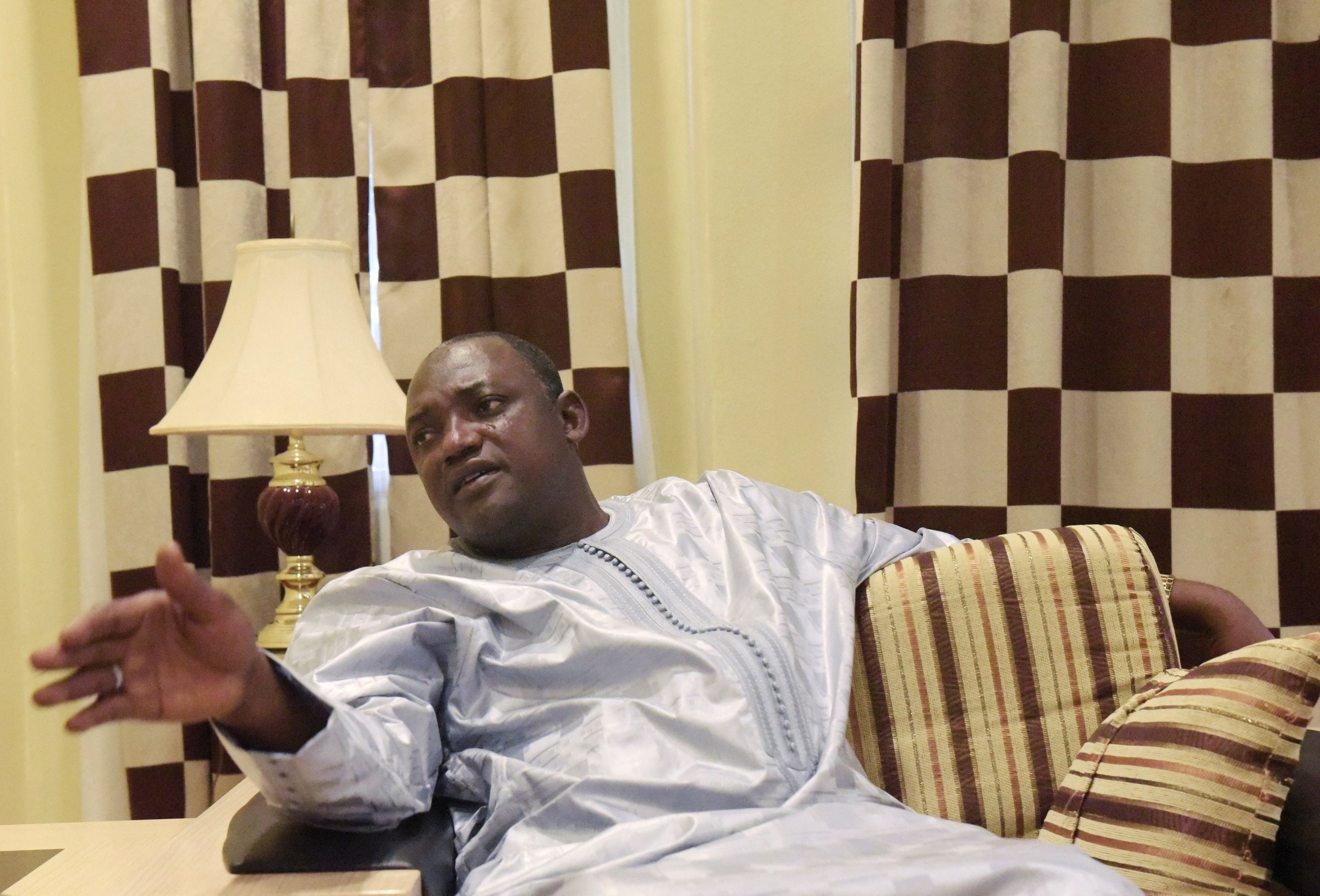
Speaking hours after Gambian dictator Yahya Jammeh flew into exile on Jan. 21, the country’s democratically elected President Adama Barrow says he will be ready to set foot again on Gambian soil in “a couple days” to begin the tricky process of governance in a country that has not seen a democratic transition of power since its independence from the British in 1965.
Barrow was inaugurated in the Gambia embassy in Dakar, Senegal’s capital, on Jan. 19, unwilling to enter the country while his life was potentially in danger. He officially replaced Jammeh, a dictator whose nearly 23-year-rule was defined by human rights abuses and crazy pronouncements, such as a claim he could cure HIV with a mixture of herbs. Jammeh also implemented an anti-homosexuality law in 2014. Shortly after, the U.S. made the country ineligible for the African Growth and Opportunity Act (AGOA), that gives certain sub-Saharan African countries duty-free, market access to the U.S— a trade pact that Trump’s transition team has since questioned.
While the chances of Gambia regaining the benefits of AGOA, even under Barrow, may be slim under a Trump administration, Barrow believes the U.S. and the Western world still has a role to play as strong advocates for democracy. “In that respect I think they have a very important role to influence certain decisions and help countries to set up and support democrats” Barrow tells TIME during a phone interview from Senegal. He would not be drawn on his thoughts on President Trump.
It was a shock win for Barrow on Dec 1. Backed by a coalition of nine parties, he secured a 9-point lead against the strongman despite fears of intimidation, an internet blackout and arrest of around 100 opposition activists. Jammeh, who once claimed he would rule the small African country for a “billion years,” refused to relinquish power, pushing the country into a political crisis, forcing Barrow to move to Senegal over fears for his safety, and nearly causing a full-blown military intervention by West African regional forces.
Huge diplomatic pressure by regional leaders in the regional bloc, the Economic Community of West African States, as well as the threat of military intervention by their troops, is what forced Jammeh’s bloodless departure. Barrow says it should set an example to others around the world. “It is a very good warning to all of the dictators [in sub-Saharan Africa]” he says. “If you lose an election, you have to go gracefully or you will be disgraced.”
The former real-estate businessman is therefore eager for ECOWAS troops— who are now helping secure the country before the President’s arrival— to help him facilitate “reforms in the army and all other sectors” before withdrawing. The strongman’s power was sustained for decades by the country’s military, which stood by him during a failed coup in 2014. It is not yet clear whether their alliances have entirely shifted to the new president. Barrow is aware of this, saying that he will also “offer them [the military] better services, a better pay rise and better conditions” he says. “I think that will keep them satisfied.”
Barrow is also wary of advocating for the prosecution of Jammeh and his allies, even though evidence is emerging that the dictator may have plundered millions of dollars before leaving the country. He says only that he would like to start a truth-and-reconciliation commission about Jammeh’s rule, and will only act once the commission has made a judgement after looking “at all the evidence.”
The issue of Jammeh’s future is one that will likely linger into Barrow’s rule. Some members of his 7-party coalition pledged that the dictator would be prosecuted for his alleged abuses, a promise which apparently spurred Jammeh to attempt to cling to power. He seems to have sought protections in negotiations over his departure; a joint, yet unsigned, declaration by the Africa Union, the U.N. and ECOWAS on Sunday pledged to protect Jammeh’s rights “as a citizen, a party leader and a former Head of State” and that he could, one day, return to Gambia.
Others are now returning to Gambia with Jammeh gone. Some 45,000 people who fled to Senegal over fears of military unrest are now beginning to return to their homes. “We have started repatriating them since yesterday (Jan. 19) ” Barrow says. “We hope to finish in two or three days time.”
But many will likely stay away. Under Jammeh, Gambians deserted the country in droves to seek brighter futures elsewhere. Remittances from overseas form around 20% of the country’s GDP, and as of Jan. 20, Gambia still represents the fifth-largest group of asylum seekers to land on Italy’s shores. The new president’s main job will be to stem that flow by attracting investors to Gambia and creating new jobs — a task he says can be achieved with responsible governance. “We now have a democratic system, everyone will now be equal” Barrow says. “It’s now one Gambia, one nation, and one people…and with that I believe things will change.”
More Must-Reads from TIME
- How Donald Trump Won
- The Best Inventions of 2024
- Why Sleep Is the Key to Living Longer
- Robert Zemeckis Just Wants to Move You
- How to Break 8 Toxic Communication Habits
- Nicola Coughlan Bet on Herself—And Won
- Why Vinegar Is So Good for You
- Meet TIME's Newest Class of Next Generation Leaders
Contact us at letters@time.com